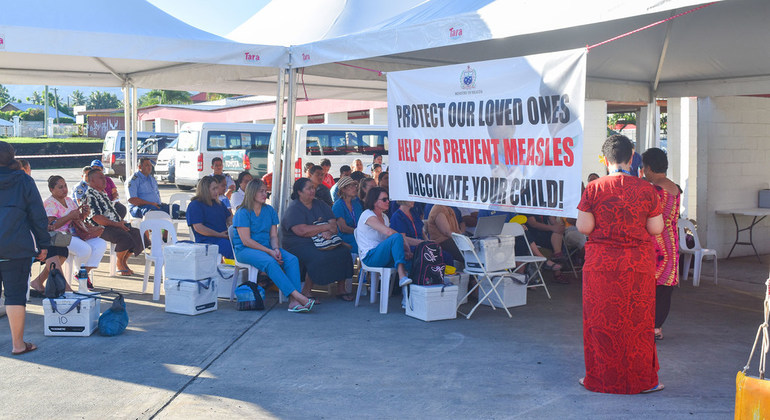The development – announced by UN emergency relief chief Mark Lowcock – means that $2.6 million will be made available for the small Pacific island, where health providers have been reportedly overwhelmed.
87 new cases in past 24 hours
“As of this morning, 4,819 measles cases have been reported to the Disease Surveillance Team since the outbreak started, according to the Ministry of Health in Samoa”, Jens Laerke, spokesperson for the Office for the Coordination of Humanitarian Affairs (OCHA), said. “There were 87 cases recorded over the past 24 hours.”
The OCHA official added that the funds would be used to provide emergency vaccinations, obstetric and neonatal care for mothers and newborns infected with measles.
Funding to overcome outbreak trauma
In addition, the funding will help to deliver mental health and psychosocial support and provide clean water and sanitation, along with public health information.
To date, a reported 120 medical teams from the World Health Organization (WHO) have also deployed throughout the country to assist with the vaccination drive.
The UN has also backed another national campaign, with workers going door-to-door to promote awareness about the importance of getting inoculations.
Such moves are seen as vital to rebuilding community confidence and trust following the deaths last year of two babies during routine vaccination, amid strong anti-vaccination sentiment.
“Obviously this is a tragedy that you can have 61 child(ren) and nine other people being basically killed by a virus that is completely preventable,” said Tarik Jasarevic, WHO spokesperson.
After the outbreak was officially declared in October, Samoan authorities announced a state of emergency in November, in response to the growing number of infections.
90 per cent of vaccination target reached
“So far, about 90 per cent of the 143,000 people it targeted have been reached, Mr. Laerke said, noting that the island nation was not alone in suffering a measles outbreak, linked to low immunisation coverage.
“By the end of November 2019, Samoa, Tonga, Fiji and American Samoa have all reported measles outbreaks,” he said. “Prior to the ongoing outbreaks, measles vaccine coverage varied in Pacific island countries and areas, ranging from 31 per cent in Samoa to 99 per cent in the Cook Islands and Nauru.”
Mr. Jasarevic added that measles outbreaks had also been reported in Australia, Cambodia, China, including Hong Kong and Macao, Japan, the Lao People’s Democratic Republic, Malaysia, New Zealand, the Philippines, the Republic of Korea and Viet Nam.
To contain the public health threat, the Government of Samoa has launched a national appeal for nearly $11 million, as it works to vaccinate its population and treat those who have already been affected.
Its youngest citizens are most at risk, OCHA said in a statement, along with pregnant women and new mothers.



